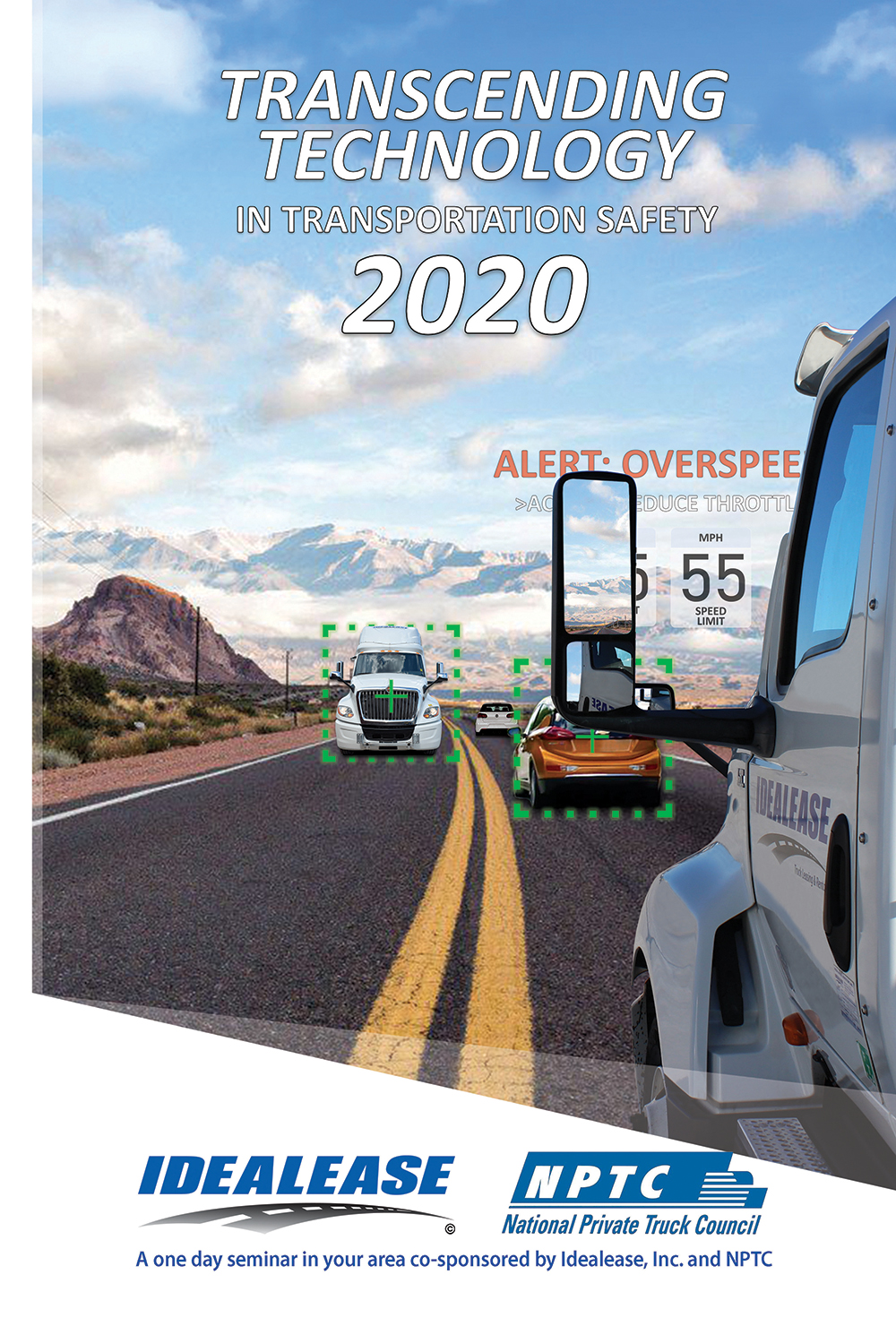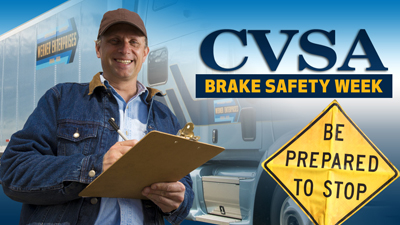Thanks Be To Truckers!
Thanks be to Truckers!
 Nearly every aspect of daily life is made possible because a truck driver delivered the goods and resources people need.
Nearly every aspect of daily life is made possible because a truck driver delivered the goods and resources people need.National Truck Driver Appreciation Week is an important time for America to pay respect and thank all the professional truck drivers for their hard work and commitment in undertaking one of our economy's most demanding and important jobs. These 3.5 million professional men and women not only deliver our goods safely, securely, and on time, they also keep our highways safe.
This year's National Truck Driver Appreciation Week is September 13-19, 2020, and takes on a special significance considering the crucial role truck drivers have played during the COVID-19 pandemic.
Americans in all fifty states have taken extraordinary steps to show their appreciation for the important work that professional truck drivers have done as we navigate our way through the coronavirus pandemic. From children passing out lunches, to "I Heart Truck" signs across America's highways, the public has taken notice of the essential role truck drivers play in their lives. President Trump and Secretary of Transportation, Elaine Chao said, "Thank God for truckers."
This week is a way to show appreciation to the 3.5 million professional men and women who not only deliver our goods safely, securely, and on time, but also keep our highways safe.
Driver Recognition Awards
Driver Appreciation week is a good time to review your award and recognition programs that you have in place. It is important that we recognize those drivers who have performed in a safe and compliant manner. Recognition awards are best used for safe driving.

A recognition award should be an award that the driver or employee cannot get anywhere else. It is best if these awards are personalized. Benefits of recognition award are that they are non-monetary and have a longer lasting effect. A driver should not be able to go and buy this award on their own. The only way to receive the award and recognition is to meet the requirements for receiving the award. These awards can be further enhanced by presenting award group presentations with peers (i.e. meetings, banquets, etc.).
As a motor carrier, there are several state and nationwide association award programs that you can enroll your drivers in. I would recommend that you contact your state trucking association for a listing of the awards programs that are available. There are a variety of awards programs available for your drivers through organizations such as the American Trucking Association (www.truckline.com) and the National Private Truck Council (NPTC). The NPTC has the Driver Hall of Fame and National Driver All-Stars driver’s awards programs that are available to NPTC members. Go to: www.nptc.org to enroll your driver.
Driver Incentive Awards:
Incentive monetary awards are best used to motivate a driver to perform. These types of incentive programs are successful in motivating the driver to achieve a specific goal such a certain fuel mileage or a clean roadside inspection.
Idealease Safety Webinar Series Registration is Now OPEN

Due to the cancellation of our on-site safety seminars in 2020 we will be presenting a safety webinar series starting next month to keep you informed and up to date on changing regulations as well as a review of existing regulations. We apologize for any inconvenience this may have caused, but we are thrilled to host the Idealease Safety Webinar Series in their place.
The webinars will be one hour in length and will address six separate topics regarding compliance and safety.
Please Click Here to register for the Idealease Safety Webinar Series.
Here are the dates and webinar topics:
Aug 12 Who is required to comply with the Federal Motor Carrier Safety Regulations
Aug 26 Qualifying a driver of a commercial motor vehicle
Sept 9 Keeping your driver safe during a pandemic
Sept 23 New hours of service regulation changes and the ELD
Oct 7 How the Drug and Alcohol Testing regulations apply to you a motor carrier
Oct 21 Developing a proactive safety and loss control program
Brake Safety Week Aug. 23rd through Aug. 29th
 Brake Safety Week, slated for late August, will proceed as scheduled, according to the Commercial Vehicle Safety Alliance (CVSA).
Brake Safety Week, slated for late August, will proceed as scheduled, according to the Commercial Vehicle Safety Alliance (CVSA).CVSA's annual event will take place August 23rd through 29th as a part of law enforcement's efforts to reduce brake-related crashes and remove unsafe commercial motor vehicles (CMVs) from the roadways.
How is this different than any other time of the year?
Throughout the year, law enforcement checks brake components as a part of the roadside inspection process. However, during this year's enforcement campaign, roadside inspectors will pay special attention to hoses and tubing. Brake Safety Week 2020 will be used to highlight the importance of these brake components.
The week-long event is a part of the greater Brake Safety Awareness Month. During August, law enforcement will provide outreach materials to drivers, motor carriers, mechanics, and others on the importance of properly maintained brakes.
Importance of brake safety
A CMV’s brake components must work together to slow and stop a vehicle. If the brake hoses/tubing are not working properly, it can affect the entire braking system and create a safety issue.
To function properly, hoses and tubing must be:
- Properly attached
- Without damage and leaks
- Flexible
When roadside inspectors identify critical out-of-service brake violations, the vehicle cannot be operated until the defects are repaired. During last year's Brake Safety Week, officers placed 13.5 percent of the CMVs they inspected out of service due to brake-related vehicle violations.
Vehicles that pass the vehicle portion of an eligible roadside inspection may receive a CVSA decal.
TSA Extends Hazardous Materials Endorsement Exemption for an Additional 90 Days
The Transportation Security Administration (TSA) is extending an exemption that gives commercial drivers with expired hazardous materials endorsements (HMEs) additional time to initiate the agency’s security threat assessment (STA). The exemption was due to expire on July 31, 2020; however, a recent TSA notice provides an additional 90 days for drivers to pursue the STA.
The agency’s decision to extend the exemption is based on the continued challenges faced by state drivers licensing centers due to public health emergency and the inability to predict how or where the virus may spread in the future. The extension will help ensure that drivers can continue to perform critical services during the pandemic.
Which drivers qualify for the exemption?
States may grant an extension of up to 180 days for a qualified individual whose HME expired or would otherwise expire between March 1, 2020, and October 29, 2020. For purposes of this exemption, an eligible individual is defined as someone who held a valid, unexpired HME with an STA (Determination of No Security Threat) on or after March 1, 2020, and the endorsement expired or is due to expire in the date range of the exemption.
If the state grants an extension, the individual with an expired HME must initiate the process of renewing his or her STA for an HME no later than 60 days before the end of the state-granted extension. TSA needs at least 60 days to process an individual’s application for STA renewal once it is submitted.
Drivers with an HME should confirm state-specifics concerning any extensions.
TSA will continue to recurrently vet drivers with expired HMEs against federal terrorism and national security-related watch lists and databases during the period of the extensions and retain its full authority to immediately.
Trucking Industry Pushes Back on Proposal to Raise Insurance Minimums
Representatives of the trucking industry have voiced opposition to legislative proposals to increase the federal minimum financial responsibility requirements for motor carriers. The current requirements are $750,000 in coverage for for-hire carriers and $1 million or $5 million hazardous materials carriers. These minimum requirements have not changed since 1985.
The National Private Truck Council (NPTC) policy is to accept the current liability coverage minimums for private fleets in the same amount as for-hire carriers ($750,000), but without having to file evidence of insurance with FMCSA. Instead, private fleets would keep evidence of coverage at their principal place of business, like hazmat carriers are currently required to do.
The Federal Motor Carrier Safety Administration issued an advance notice of proposed rulemaking on raising the minimum financial responsibility requirements for motor carriers, freight forwarders, and brokers on November 28, 2014, but withdrew the proceeding in 2017 due to insufficient data.
The INVEST in America Act, an infrastructure bill passed by the U.S. House of Representatives on July 1, 2020, includes a provision that would mandate increasing the for-hire carrier minimum financial responsibility to $2 million. This provision is not in the Senate version of the bill.






